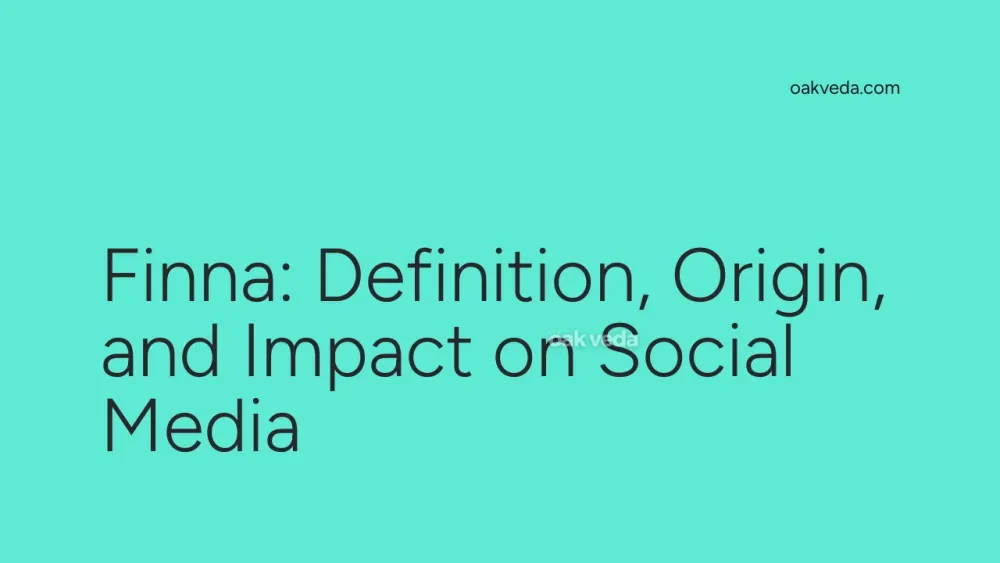
What is Finna?
"Finna" is a popular slang term that has gained significant traction in social media and casual online conversations. Essentially, it's a contraction of the phrase "fixing to" or "fixing on," which means "getting ready to" or "about to." In modern usage, "finna" is synonymous with "going to" or "about to," expressing imminent action or intention.
Origin and Development of Finna
The term "finna" has its roots in African American Vernacular English (AAVE) and Southern American English. It evolved from the more formal "fixing to," which has been used in Southern dialects for generations. Over time, through natural language evolution and the need for brevity in digital communication, "fixing to" was shortened to "finna."
While the exact timeline of its origin is unclear, "finna" has been in use for several decades in spoken language. However, its popularity exploded with the rise of social media platforms, where concise and catchy expressions thrive.
How Finna Works in Communication
"Finna" functions as a verbal marker indicating future action or intent. It's typically used at the beginning of a sentence or phrase to signal that the speaker is about to do something. For example:
- "I'm finna go to the store."
- "She finna start her new job next week."
The term adds a sense of immediacy and informality to statements, making it particularly popular in casual, fast-paced online conversations.
Popular Examples of Finna in Social Media
On platforms like Twitter, Instagram, and TikTok, "finna" is frequently used in various contexts:
- Expressing excitement: "I finna have the best weekend ever!"
- Sharing plans: "We finna drop a new track tomorrow. Stay tuned!"
- Reacting to events: "This movie finna make me cry."
Memes and viral content often incorporate "finna" to add humor or relatability to situations, further cementing its place in internet culture.
Impact of Finna on Social Media Culture
The widespread use of "finna" on social media platforms has had several notable impacts:
-
Language evolution: It exemplifies how internet slang can quickly become mainstream, influencing everyday communication.
-
Cultural exchange: As a term originating from AAVE, its adoption by a broader audience has sparked discussions about cultural appropriation and the spread of linguistic innovations.
-
Generational markers: The use of "finna" can serve as a generational and cultural identifier, signaling familiarity with current internet trends and youth culture.
-
Informal tone: Its usage contributes to the overall casual and conversational tone prevalent on social media platforms.
Controversies Surrounding Finna
The popularization of "finna" has not been without controversy. Some key points of debate include:
-
Cultural appropriation: There are concerns about the term being adopted by non-AAVE speakers without proper acknowledgment of its origins.
-
Linguistic prescriptivism: Some argue against the use of "finna" in formal contexts, viewing it as improper English.
-
Misuse and overuse: As with many slang terms, there are debates about its appropriate usage and concerns about it becoming overused or misused by those unfamiliar with its origins.
How Brands and Influencers Use Finna
Forward-thinking brands and influencers have incorporated "finna" into their social media strategies to connect with younger audiences:
-
Relatable content: Using "finna" in posts to appear more authentic and in touch with current language trends.
-
Targeted advertising: Incorporating the term in ad copy to appeal to specific demographics.
-
Meme marketing: Creating or participating in meme trends that use "finna" to increase engagement and virality.
However, brands must be cautious to avoid appearing inauthentic or appropriative when using such terms.
Future Trends Related to Finna
As language continues to evolve in the digital age, we can expect several trends related to "finna" and similar slang terms:
-
Continued mainstream adoption: As with many internet slang terms, "finna" may become increasingly common in everyday speech.
-
Evolution of meaning: The term's usage and connotations may shift over time, as is common with slang expressions.
-
Academic interest: Linguists and sociologists may conduct more research on the term's impact on language and culture.
-
New variations: As with all language, we may see new forms or related terms emerge from "finna."
FAQs about Finna
-
Is "finna" considered proper English? While not considered standard English, "finna" is a legitimate part of AAVE and internet slang.
-
Can "finna" be used in formal writing? Generally, it's best to avoid using "finna" in formal or professional contexts unless specifically discussing the term.
-
Is it offensive to use "finna" if it's not part of your dialect? While not inherently offensive, it's important to be aware of the term's origins and use it respectfully.
-
How do you pronounce "finna"? It's typically pronounced as "FIN-uh."
-
Are there any alternatives to "finna"? Common alternatives include "about to," "going to," or "gonna."
In conclusion, "finna" represents the dynamic nature of language in the digital age. Its journey from regional dialect to widespread internet slang showcases how social media can amplify and transform linguistic expressions. As with all language trends, its usage continues to evolve, reflecting broader cultural shifts and the ever-changing landscape of online communication.
You may be interested in:
- Valid: Definition, Origin, and Impact on Social Media
- Online Community: Definition, Origin, and Impact
- Girl Math: Definition, Origin, and Impact on Social Media
- BeReal: Definition, Origin, and Impact on Social Media
- Boyfriend Effect: Definition, Origin, and Impact on TikTok
- FR (For Real): Definition, Origin, and Impact on Social Media

